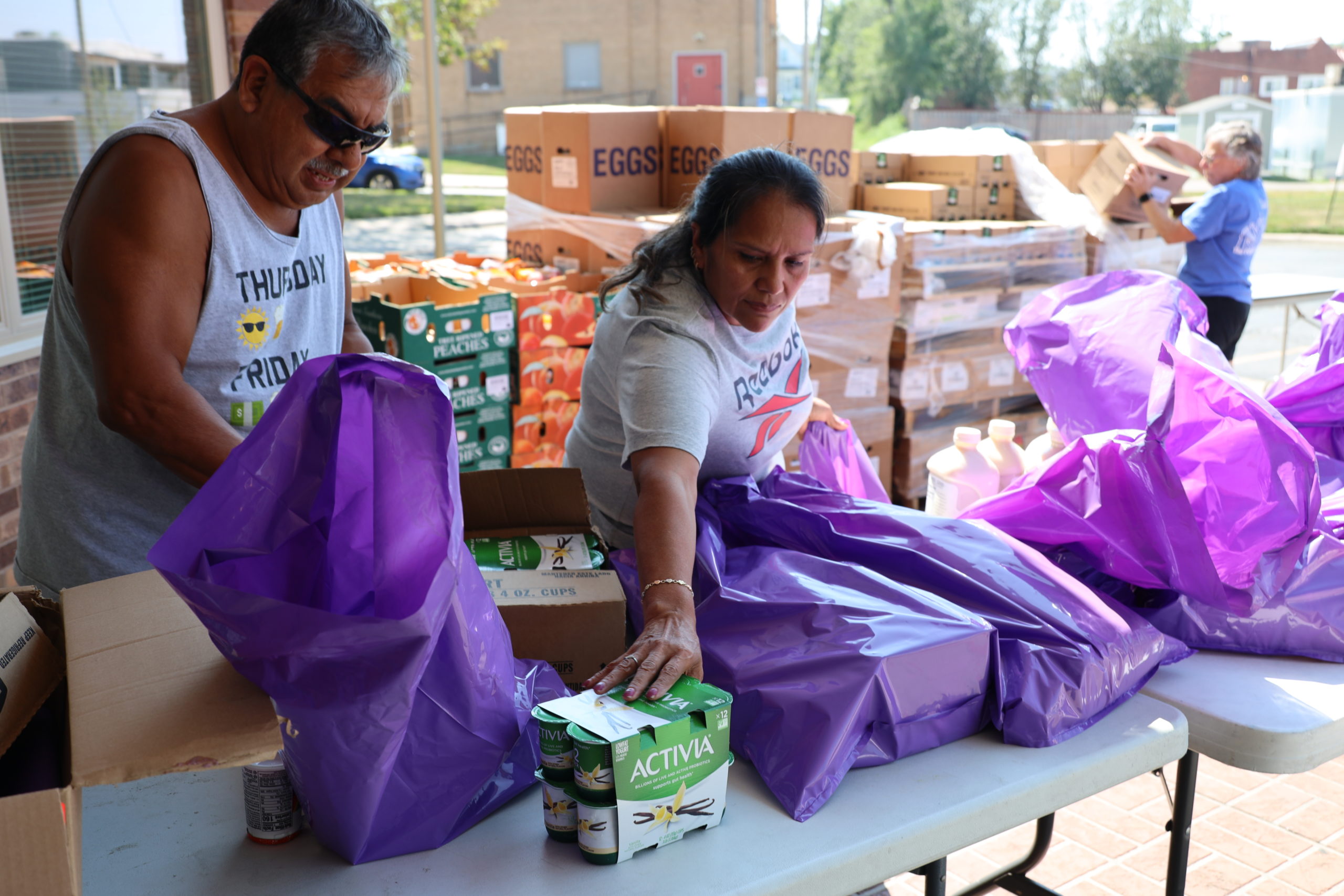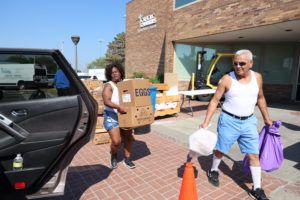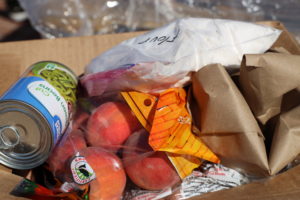
Volunteers Ricardo Sanchez and Martha Hernandez help organize food for distribution at Catholic Charities Juan Diego Center in Omaha. SUSAN SZALEWSKI/STAFF
News
Economic pain is visible in food lines, shelters, therapists’ offices
August 2, 2022
A line of cars wrapped around the block at Catholic Charities Juan Diego Center in south Omaha.
Occupants of the vehicles waited on a sweltering summer day to receive drive-through food pantry supplies. Others on foot or bicycle approached a table set up outside to receive their bundle.
Long lines have become typical at the food pantry, Catholic Charities officials said. Pantry shelves empty soon after they’re filled with donations.
The need for food and other support has grown as inflation has reared up, according to officials from Catholic Charities, the Society of St. Vincent de Paul Omaha and the Stephen Center homeless shelter in Omaha.
Francisco – who’s received groceries and other help at the Juan Diego Center and now works there as a volunteer – is among those feeling the pain. He used to pay $20 to fill his Honda Civic’s gas tank. Now, he pays double that.
“A big difference,” he said.
Grocery prices, especially for meat, he notes, have likewise skyrocketed.

Volunteers Carla Burns-Lee and Francisco Acosta bring groceries to a vehicle as part of the Juan Diego Center’s drive-through distribution. SUSAN SZALEWSKI/STAFF
Another volunteer and beneficiary of the Juan Diego Center also has been watching the rising prices. She asked to not be identified.
“Maria” and her husband are small-business owners. Their shop has taken a hit from the economy, she said. But instead of raising prices, they’ve lowered them.
Their customers – the people of their community – are struggling, Maria said through her Spanish-speaking translator, Francisco.
Maria and her husband find ways to save, especially because they’ll be welcoming their adopted daughter, a relative’s newborn, any day now.
Maria said she’s been trying to stock up on diapers and formula, which have been in low supply. The Juan Diego food pantry has helped the family with groceries.

SUSAN SZALEWSKI/STAFF
Increasingly, others like Francisco and Maria are seeking help – to obtain food, clothing, counseling and shelter and to help pay rent and utility bills – as economic woes and the related stress increases, according to officials from the nonprofit organizations.
MORE SEEKING SHELTER
The Stephen Center has been full or nearly full the last six months, said Michael Wehling, executive director.
In the past year, the homeless shelter has seen an increase in the number of people it serves, a jump of more than 100 people from July 2021 to July 2022, said Dawn Olijnek, chief operations officer at the Stephen Center.
The ending of a government eviction moratorium, which had been in place for the COVID-19 pandemic, appears partly to blame, Olijnek said. “You can see … immediately following the expiration (0f the moratorium) that the number of people seeking shelter increased.”
The shelter also has documented more homeless people who say they have mental health disorders, physical disabilities and chronic health conditions.
“People who have those kind of conditions probably can’t take advantage of the job finders market,” Olijnek said. “They’re probably already on Social Security, disability income or a pension of some sort.”
With fixed incomes, they struggle more because of inflation, she said.
“There’s housing resources out in the community,” Wehling said, “but we’re still seeing people coming back to homelessness, and we’re still seeing people come into homelessness for the first time.
“But what’s the root cause? It’s almost always mental health and the lack of ability to manage that,” he said. “A lot of times it’s because you don’t have health insurance, you can’t afford your meds.”
NEEDS EVERYWHERE
Demand for food and for financial assistance for rent and utilities have increased across the Omaha area, said Marty Smith, executive director of the Society of St. Vincent de Paul Omaha.
All 30 of its parish-based conferences are reporting a rise in need, he said. More people have been shopping at St. Vincent de Paul thrift stores as well.
“Across the board, the conferences, the stores, the pantry, the homeless ministries all have seen an increase in people applying for or needing help,” Smith said.
The COVID-19 pandemic had increased by 50% the number of people seeking food pantry help, he said, and with the economic problems that followed, those numbers increased another 20%.
“It just kept climbing,” he said of the need. “And we’re seeing more first-time pantry users, people whose budgets are stretched.”
“Even if you have a job, inflation affects your ability to stay current with all your bills,” he said. “I think COVID stretched people, but some were able to just maintain. Now inflation has increased costs.
“We had a couple of people who said they needed deliveries from the pantry because they can’t get to the pantry anymore. They just don’t have any gas. They can’t drive.”
The number of homeless people picking up sack lunches and free clothing at the organization’s Holy Family Community Center has jumped by 20-30%, Smith said.
“I think it’s because more people are on the street. They’re getting evicted or just kicked out of their families, or whatever.”
MORE DEMAND, LESS SUPPLY
Catholic Charities has been serving more than 24,000 people a month at its Omaha food pantries, said Mikaela Schuele, director of emergency and supportive food services.
The pantries have been helping 58% more people than a year ago, with 38% less food, said Dave Vankat, chief community engagement officer.
“So basically, those we serve are getting less than they would’ve received a year ago,” he said. “It only goes so far. Our pantry shelves are bare much of the time, because as soon as we get stuff in, it goes right out with that day’s distribution.
“God always provides,” he said. “We’re not sure where it comes from, or when or how. It shows up just kind of when we need it. Which is good, but it’s not the same volume as we were seeing a year ago.”
Home delivery of food to the elderly and homebound, many on fixed incomes, also has increased, Vankat said.
Some of the elderly served at the St. Martin de Porres Center eat prepared meals when they go to the center for social activities.
“We provide both breakfast and hot lunch,” Vankat said, plus “enough food that they can take some home at the end of lunch.”
Even with lower food supplies, Catholic Charities food pantries share what they have with other organizations that distribute food, Schuele said. “We’re not going to hoard.”
“To us, it’s not a competition. It’s just about the person at the end of the rope whom we are serving. … the most vulnerable in society.”
INCREASING STRESS
Financial difficulties can fester and spread into other aspects of life, though the impact can be difficult to track.
“Any kind of stressor can be a trigger for domestic violence to increase,” Vankat said. “Financial stresses within the family or couple can be an issue which sends someone to our shelter.”
The double impact of COVID-19, followed by what many have deemed a recession, has affected everyone, Schuele said. “Every generation, every population” has been impacted.
“It’s not just the inaccessibility of food,” she said. “It’s gas prices. It’s the stress people are feeling.”
“Our community is tired.”
Catholic Charities tries to provide “stability through the chaos,” she said.
People from all walks of life are suffering from anxiety, depression and addictions, said Jacque LaPlant, director of Catholic Charities’ behavioral health program.
The program is seeing a 25-30% increase in people seeking help for mental health issues, she said.
The increase started with the COVID-19 pandemic and has continued, LaPlant said.
“I think people are just not seeing an end to COVID, and then with the inflation and all of those things, it’s just kind of creating the perfect storm.”
Job insecurity “and the uncertainty of the times we’re in right now” contribute to mental health problems, LaPlant said. “One thing just feeds into another.”
“People are looking for someone to tell them that it’s OK, you’re normal,” she said. “You’re not the only one who’s feeling this way.”
The organization has three outpatient therapists, plus another seven who work in a school mental health program that serves 24 of the 70 Catholic schools in the archdiocese. All therapists follow Catholic social teaching.
Currently there’s no waiting list for Catholic Charities’ outpatient treatment, so people can get in fairly quickly, LaPlant said.
Some use insurance to help cover the cost, while others pay cash. Catholic Charities charges according to a client’s ability to pay.
HOW TO HELP
Donations of nonperishable groceries to food pantries are urgently needed.
“There’s so much need right now,” Schuele said. “Contact your local pantry – that’s the frontline – and ask what they need.”
Common staples are pasta, canned fruits and vegetables, cereal, rice and beans, canned meats and soups, and macaroni and cheese.
Clothing donations for St. Vincent de Paul thrift stores also help. Coats especially are needed for a fall give-away.
“If people want to just drop off winter coats at any of the stores, that would be wonderful because there’s a constant need,” Smith said.
The nonprofits could also use monetary gifts and volunteers.
“Just the way that we can help in a little way gives people a renewed sense of the possibility that they’ll get through it somehow,” Smith said. “I think that’s the Spirit working, clearly.
“The fundamental human connection is where the real healing happens, the real energy for ‘Yes, I can do this’ is created.”